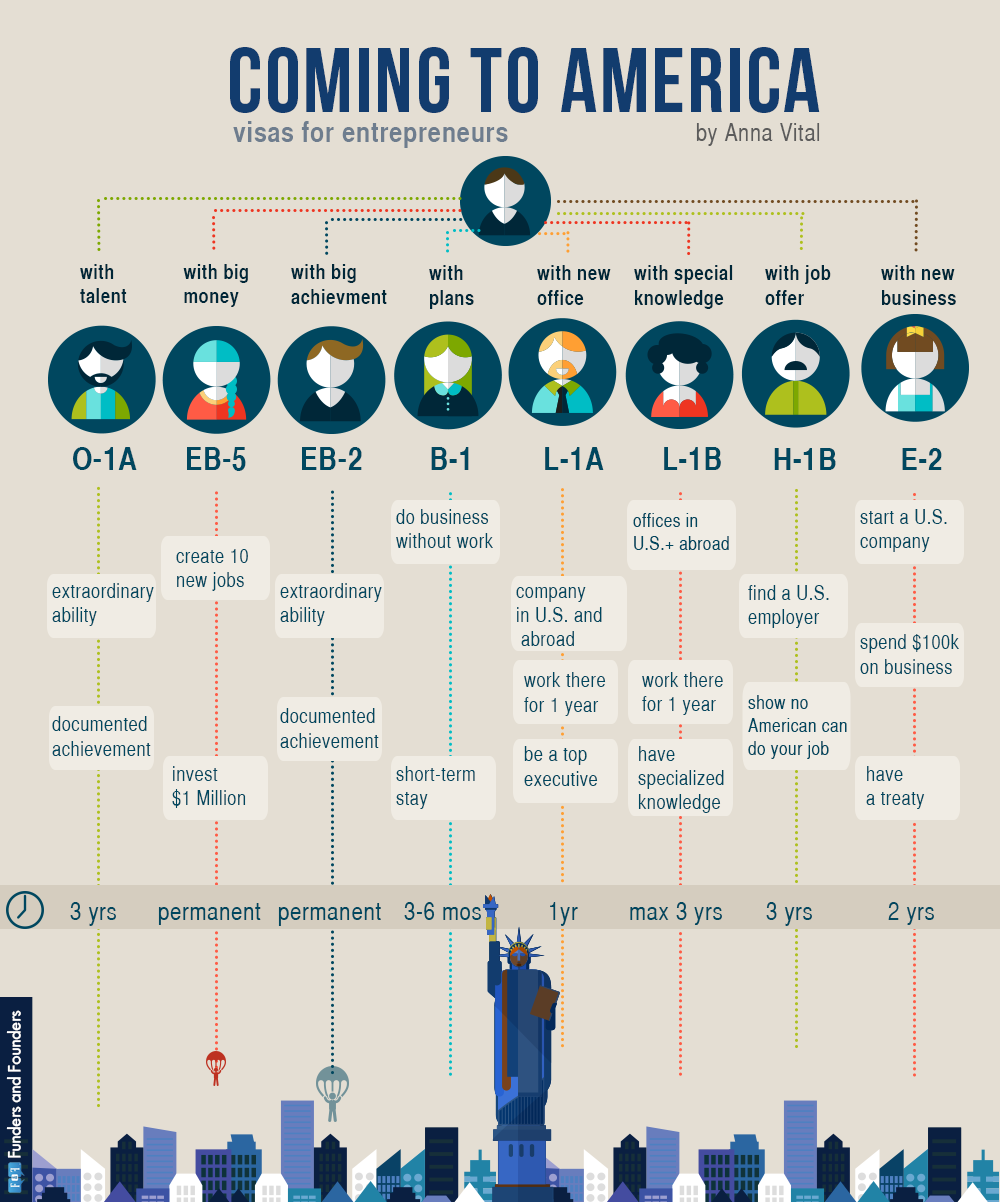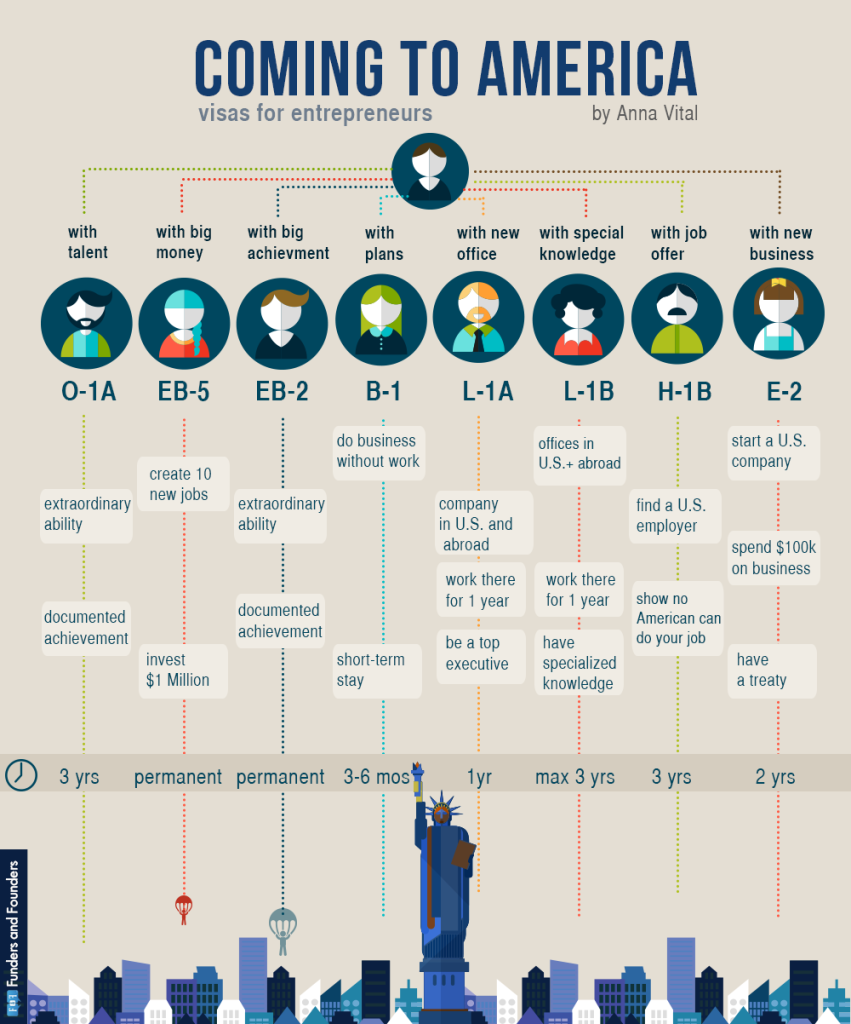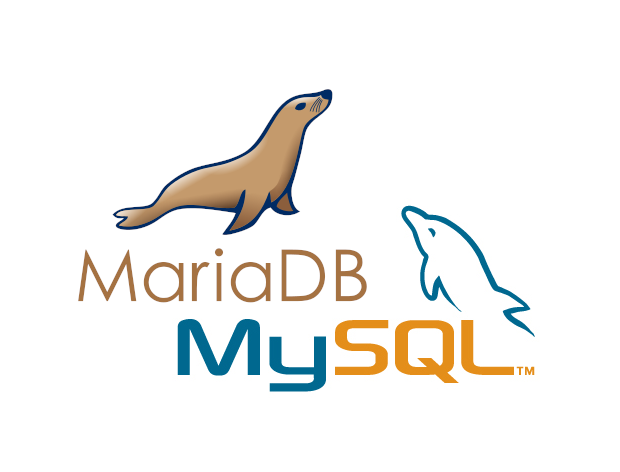It is no secret that some of Silicon Valley’s tech giants were founded by immigrants. Sergey Brin, a Russian emigrant, co-founded Google; Andrew Grove, originally from Hungary, co-founded Intel; both Steve Chen of YouTube and Jerry Yang of Yahoo came to the U.S. from Taiwan.
Immigrants continue to become some of the most successful founders in United States. Brazilian-born Mike Krieger moved to California in 2004 where he met future partner and fellow co-founder of Instagram. Danish co-founders Jon Froda and Anders Pollas created Podio in early 2009. Indonesian-born Malcolm Ong met his fellow co-founder, Michael Karnjanaprakorn, co founded Skillshare while they both working at other startups.
How did they get here? And, most importantly, how can we get you here? There are more than a couple of ways.
Let’s start with the most optimal ways – the ways that ensure you get a green card.
Many Ways Of Coming to America
Option 1. Alien Investor – this is the EB-5 immigrant visa that asks you to invest $1 million in a U.S. business. If that business is in rural area, you only need to invest $500,000.
But what if you don’t have that kind of cash?
Option 2. EB-2 (C) visa — this is considered an “employment visa,” but under the (C) variety does not require you to have an employer. What you need is an advanced degree (masters and higher) or an exceptional ability in your field. Also, you will have to should that brining you to the United Stated it is in the national interest of the United States.
What if you are so young that you don’t have exceptional abilities yet? You can still come in.
Option 3. E-2 Treaty Investors – do not worry, this time they will not ask you to invest a million. All you need to do is open a business in the U.S., invest at least $100, 000 in it. You also need to be from a country that is on the list of treaty investors. A lot of countries are.
If you main asset is your talent, you have another option.
Option 4. O-1 visa is for people with exceptional abilities, including abilities in doing business. Say you wrote an app back home that got written up in magazines and someone famous reviewed it on YouTube? You can try for this type of visa. You will need a U.S. employer to sponsor you. Hopefully that employer is an amazing startup you want to work for.
Option 5. L1 visas. The first kind is the L1A – you need to be ab executive or a top manager of a company that has offices in your country and in the U.S. You need to have worked at that foreign office for at least a year during that last three years. And they need to be sending you to the U.S. If the company does not have a U.S. office yet, you can be the one who opens it. the L1B kind is where you are not an executive, but you have some specialized knowledge. if the company sending you to the United States is not the one you ultimately want to work for, you will want to jump ship sooner or late. Many people have.
Option 6. H1B visa. This visa is for employees. There are a lot of requirements such as labor certifications, caps on the number of visas, etc. If you have i, but want to be an entrepreneur, use the time while you are on H1B to find the startup you actually want to work for.
Option 7. B-1 visa. This is a business visa. It is short-term, only 3-6 months. You can extend it once by another 6 months, totaling 12 months in the U.S. The downside is that you cannot work on this visa. But you can negotiate and network, etc.
if no other solution is available, B-1 is your way to come to America and then figure out the better way.
There are of course other options coming to America like J1, F1 but they are less than a straightforward way for an entrepreneur.
Things are changing quickly for entrepreneurs in America, for the better. We will be hosting the “International Founders and Startup Immigration” to discuss the best strategies and hear from the attorneys and investors.
Update: Lastly, there is the Startup Visa, that is not an option yet, because it has not been passed as a law. As of December 1st, the current senate bill calls for a number of changes to immigration law. Among them, it would create a new type of visa allowing foreign-born entrepreneurs legally in the U.S. to stay if they can raise $100,000 in capital and hire at least two American workers during their first year holding the visa.
courtesy : Funders and Founders




